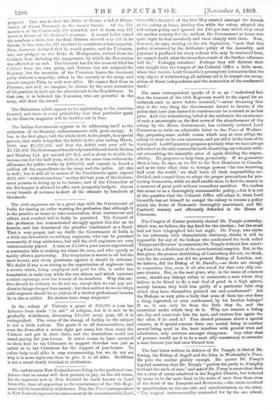The Chapter of Exeter probably elected Dr. Temple yesterday, which
was, we believe, the day fixed for the election ; but the event had not been telegraphed late last night. Dr. Pusey, who sticks to his adversary with characteristic obstinacy, thinks it will be impossible for any of the bishops who condemned the book called 'Essays and Reviews' to consecrate Dr. Temple without first receiv- ing from him a disclaimer of the more heretical essayists. But, in the first place, the present Archbishop of Canterbury did not, we think, vote for the censure, nor did the present Bishop of London, nor, we believe, did the Bishop of St. David's,—so there are enough to consecrate him, even if all who voted for that very silly cen- sure abstain. But, in the next place, why, in the name of common sense, should any bishops refuse to consecrate a man whom they believe to be fitted to do a vast deal of good in a high sphere, merely because they hold him guilty of a particular false step which they have themselves pointed out and-condemned? Are the Bishops so very prim a body that none of them has ever done a thing regretted, or even condemned, by his brother bishops? If so, it can only be from the little they do, and the constraint under which they do it. Why not censure a bishop one day and consecrate him the next, and censure him again the day after, if he need it? This absurd primness about a special censure, as if special censure from one mortal being to another mortal being need in the least interfere with general trust and admiration, only survives amongst clergymen. Any other class of persons would see it to be a most silly consistency to ostracize a man because you had once blamed him.






























 Previous page
Previous page